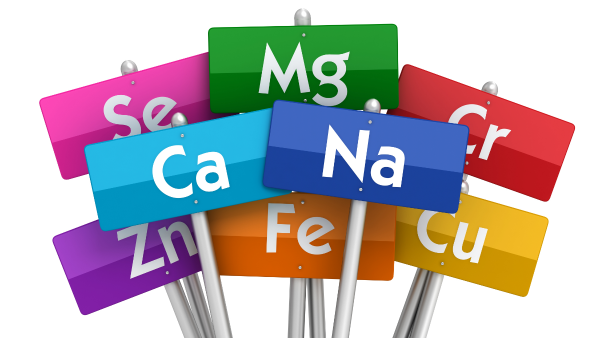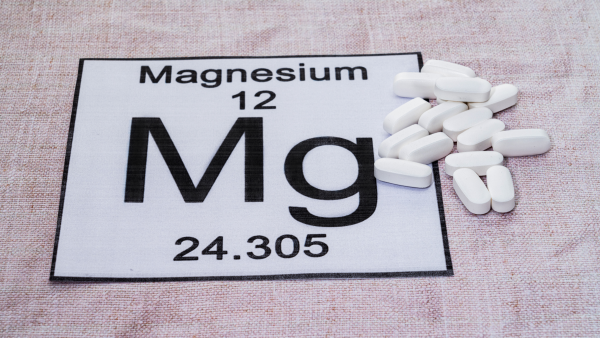Magnesium, selenium, iodine...these are just a few of the many essential minerals that we need to consume through food. Unfortunately, they are easily neglected in our diet.
In this article, you will learn about the important role individual minerals play in the body and how you can ensure that you meet your daily needs.
Magnesium
Magnesium plays an important role in more than 300 enzyme reactions in the body. It is of great importance for muscle function and maintaining bone health. In addition, magnesium is needed for signal transmission in nerve cells. [1]
A magnesium deficiency manifests itself in calf cramps, sleep disorders, muscle tension and twitching, and low sensitivity to stress. [2]
The European Food Safety Authority confirms the following effect of magnesium in its Health Claims Regulation:
Magnesium contributes
- to a normal energy metabolism in
- to normal psychological function in
- to reduce tiredness and fatigue in
- to normal muscle function in
- to maintain normal bones in
- to maintain normal teeth in
- to normal functioning of the nervous system in
- to normal protein synthesis in
- to electrolyte balance in
Here you can learn more about magnesium.
Magnesium requirements
According to the German Nutrition Society (DGE), the recommended daily requirement of magnesium is between 300 and 400 mg. [3]
Magnesium-rich foods
There are only a few foods that are high in magnesium, so it is often difficult to meet your needs through food alone. However, there are some foods that are particularly rich in magnesium and can therefore serve as excellent sources.
The following foods are characterized by their high magnesium content: [4]
- Seeds such as hemp seeds: 700 mg/100 g
- Cocoa: 499 mg/100 g
- Almonds: 270 mg/100 g
- Mussels: 238 mg/100 g
- Fish such as mackerel: 97 mg/100 g
- Green leafy vegetables such as spinach: 87 mg/100 g
- Legumes such as black beans: 70 mg/100 g
- Avocado: 29 mg/100 g

Silicon
Silicon is a component of connective tissue and appears to contribute to the strength of skin, hair, nails and bones. It also probably plays a role in the formation and stabilization of cartilage and joints. There is also evidence that silicon is involved in collagen production, which is important for healthy skin, blood vessels and bones.
Silicon-rich foods
Millet, oats, rice, potatoes and peanuts are particularly rich in silicon.
MSM
Methylsulfonylmethane (MSM) is organic sulfur. Sulfur is found in connective tissue, among other places, and is believed to contribute to the maintenance of tendons, cartilage, muscles, bones and skin. Sulfur is also part of hormones and proteins and is important for their function. Scientists also suspect that MSM has anti-inflammatory and detoxifying effects.
Sulfur-rich foods
Onions, garlic and protein-rich foods such as fish, meat, legumes, eggs and dairy products are good sources of sulfur.
Zinc
Zinc is essential for the functioning of the immune system and plays an important role in wound healing and skin health. [5]
Approximately 32% of men and 21% of women do not consume enough zinc through their diet. [6] Therefore, zinc deficiency is quite common. This manifests itself in symptoms such as poor wound healing, reduced sense of taste and smell, diarrhea and loss of appetite.
The European Food Safety Authority (EFSA) confirms the following effect of zinc in its Health Claims Regulation:
zinc
- contributes to the maintenance of normal skin
- contributes to normal protein synthesis
- contributes to the maintenance of normal testosterone levels in the blood
- contributes to the maintenance of normal hair
- contributes to the maintenance of normal nails
- contributes to normal macronutrient metabolism
- helps protect cells from oxidative stress
- contributes to normal fertility and normal reproduction (reproductive capacity)
- contributes to normal cognitive function
- contributes to the normal function of the immune system (physical defense)
- has a function in cell division
Zinc requirement
The recommended daily requirement of zinc according to the German Nutrition Society (DGE) is between 10 and 16 mg. [7] The requirement depends mainly on the consumption of foods containing phytic acid, such as legumes and cereals, since phytic acid impairs the absorption of zinc by binding zinc.
Zinc-rich foods
The following foods are rich in zinc: [8]
- Oysters (45.1 mg/100 g)
- Liver, such as veal liver (11.2 mg/100 g)
- Nuts and seeds, such as hemp seeds (9.9 mg/100 g)
- Cocoa (9.63 mg/100 g)
- Meat, such as beef (8.78 mg/100 g)
Iron
Iron is particularly important for the transport of oxygen in the blood and plays an important role in many biochemical reactions. [9]
An iron deficiency leads to impaired formation of red blood cells. Pregnant women and menstruating women have an increased risk of iron deficiency. Typical symptoms of iron deficiency are paleness, difficulty concentrating, easy fatigue, reduced performance, loss of appetite, dry skin and increased susceptibility to infections. [10]
The European Food Safety Authority (EFSA) confirms the following effect of iron in its Health Claims Regulation:
iron
- contributes to the normal formation of red blood cells and haemoglobin
- contributes to normal oxygen transport in the body
- contributes to normal energy metabolism
- helps reduce tiredness and fatigue
- contributes to normal cognitive function
- contributes to the normal function of the immune system
- has a function in cell division
Iron requirements
The recommended daily requirement of iron according to the German Nutrition Society (DGE) is between 10 and 15 mg. [11]
Iron-rich foods
Iron-rich foods are found in both plant and animal foods. However, animal iron can be better absorbed and utilized. The absorption of plant iron can be improved by combining it with vitamin C.
The following foods are rich in iron: [12]
- Cocoa (13.9 mg/100 g)
- Nuts and seeds, such as hemp seeds (7.95 mg/100 g)
- Liver (7.4 mg/100 g)
- Meat, such as beef (5.46 mg/100 g)
- Seafood, such as oysters (5.78 mg/100 g)
Boron
Boron appears to play an important role in bone maintenance by supporting bone formation and regulating calcium metabolism. It is also thought to be involved in the formation and stabilization of collagen , an important protein in connective tissue. In addition, boron may play a role in hormone metabolism, particularly estrogens.
Boron-rich foods
Peaches, cucumbers, dried fruits, nuts and beetroot contain a lot of boron.
Copper
Copper is an essential component of many proteins and plays an important role in carbohydrate, protein and fat metabolism. It is also important for the immune system and iron levels. [13]
Symptoms of copper deficiency can include tiredness, exhaustion, bone loss, memory and concentration problems, paleness and premature graying.
The European Food Safety Authority (EFSA) confirms the following effect of copper in its Health Claims Regulation:
copper
- contributes to normal energy metabolism
- contributes to the normal functioning of the nervous system
- contributes to the normal function of the immune system (physical defense)
- helps protect cells from oxidative stress
- contributes to the maintenance of normal connective tissue
- contributes to normal iron transport in the body
- contributes to normal hair pigmentation
Copper requirements
The recommended daily requirement of copper according to the German Nutrition Society (DGE) is between 1.0 and 1.5 mg. [14]
Copper-rich foods
Foods rich in copper include: [15]
- Liver, such as beef liver (14.59 mg/100 g)
- Oysters (5.71 mg/100 g)
- dried shiitake mushrooms (5.17 mg/100 g)
- Nuts and seeds, such as sesame (4.08 mg/100 g)
- Cocoa (3.79 mg/100 g)
- Seafood, such as lobster (1.55 mg/100 g)

Manganese
Manganese plays an important role in connective tissue. It also activates numerous enzymes and is required for protein synthesis. A lack of manganese manifests itself in bone problems, reduced fertility and disorders in carbohydrate and fat metabolism. [16]
The European Food Safety Authority (EFSA) confirms the following effect of manganese in its Health Claims Regulation:
manganese
- contributes to normal energy metabolism
- contributes to normal connective tissue formation
- helps protect cells from oxidative stress
- contributes to the maintenance of normal bones
Manganese requirement
The recommended daily requirement of manganese according to the German Nutrition Society (DGE) is between 2 and 5 mg. [17]
Manganese-rich foods
The following foods are rich in manganese: [18]
- Spices such as cardamom (28 mg/100g)
- Nuts such as hazelnuts (13 mg/100g)
- Garlic (2 mg/100g)
- Fruit like pineapple (2 mg/100g)
- Legumes such as lima beans (2 mg/100g)
- Algae such as wakame seaweed (1 mg/100g)
- Oysters (1 mg/100g)
Chrome
Chromium plays an important role in carbohydrate metabolism and supports the regulation of blood sugar levels. It is also involved in the storage of carbohydrates, fats and proteins.
A deficiency in chromium can lead to coordination problems, weight loss and problems with blood sugar regulation. [19]
The European Food Safety Authority (EFSA) confirms the following effect of chromium in its Health Claims Regulation:
chrome
- contributes to normal macronutrient metabolism
- contributes to the maintenance of normal blood sugar levels
Chrome requirements
The recommended daily requirement of chromium according to the German Nutrition Society (DGE) is between 30 and 100 µg. [20]
Chromium-rich foods
Chromium-rich foods include meat, grains, fruits, vegetables and nuts. Chromium content can also depend greatly on how the food is processed. For example, if it comes into contact with stainless steel, its chromium content can increase. [21]
Selenium
Selenium plays an important role in the metabolism of thyroid hormones. It also protects against oxidative stress and is important for the immune system. [22]
Germany is a selenium-deficient area, so selenium deficiency is widespread. A selenium deficiency manifests itself in reduced fertility, exhaustion, concentration problems and an increased susceptibility to infections.
The European Food Safety Authority (EFSA) confirms the following effect of selenium in its Health Claims Regulation:
selenium
- contributes to the maintenance of normal hair
- contributes to the maintenance of normal nails
- contributes to normal thyroid function
- helps protect cells from oxidative stress
- contributes to the normal function of the immune system (physical defense)
- contributes to normal sperm formation (production of sperm cells)
Learn more about selenium here.
Selenium requirement
The recommended daily requirement of selenium according to the German Nutrition Society (DGE) is between 60 and 70 µg. [23]
Selenium-rich foods
The following foods are good sources of selenium: [24]
- Brazil nuts
- Oysters
- liver
- Fish
- Seeds
- seafood
- Meat
iodine
As a component of thyroid hormones, iodine is important for the function of the thyroid gland, but all other organs also need iodine. It plays an important role in energy metabolism and the nervous system. [25]
Iodine deficiency is one of the most common nutritional deficiencies. The soil in Germany is low in iodine, which is why iodine deficiency is also widespread here. Iodized table salt can help to meet the need, but is often not enough on its own.
An iodine deficiency manifests itself in goiter formation, tiredness and exhaustion, rough and dry skin, obesity, easy chills and hair loss. [26]
The European Food Safety Authority (EFSA) confirms the following effect of iodine in its Health Claims Regulation:
iodine
- contributes to normal energy metabolism
- contributes to normal cognitive function
- contributes to the normal functioning of the nervous system
- contributes to normal production of thyroid hormones and normal thyroid function
- contributes to the maintenance of normal skin
Iodine requirement
The recommended daily requirement of iodine according to the German Nutrition Society (DGE) is about 200 µg. [27]
Iodine-rich foods
The following foods are good sources of iodine: [28]
- Iodized table salt (5070 µg/100 g)
- Seaweed, such as dried nori seaweed (2320 µg/100 g)
- Eggs (49.2 µg/100 g)
- Milk (34.3 µg/100 g)
- Fish, such as salmon (26.2 µg/100 g)
- Seafood, such as shrimp (14.7 µg/100 g)
- Poultry, such as turkey (2.1 µg/100 g)
- Legumes, such as kidney beans (1.1 µg/100 g)
- Vegetables such as carrots (0.5 µg/100 g)

Conclusion: Minerals are indispensable
The body needs many minerals and trace elements every day to function optimally. Ideally, these needs should be met through a healthy, varied diet. However, this is not always possible. High-quality nutritional supplements can help ensure the supply of these important nutrients.
The Multimineral Complex Daily from Viktilabs contains magnesium, silicon, sulfur, zinc, iron, copper, boron, manganese, chromium, selenium and iodine. It is developed in Germany according to the highest quality standards and is free of unnecessary additives.
[1] https://www.ncbi.nlm.nih.gov/pmc/articles/PMC5637834/
[2] https://pubmed.ncbi.nlm.nih.gov/29387426/
[3] https://www.dge.de/forschung/referenzwerte/magnesium/
[4] https://nutritiondata.self.com/foods-000120000000000000000.html
[5] https://www.ncbi.nlm.nih.gov/pmc/articles/PMC3724376/
[6] https://www.bmel.de/DE/themen/ernaehrung/gesunde-ernaehrung/nationale-verzehrsstudie-aufnahme.html
[7] https://www.dge.de/forschung/referenzwerte/zink/?L=0
[8] https://nutritiondata.self.com/foods-000124000000000000000.html
[9] https://www.ncbi.nlm.nih.gov/pmc/articles/PMC3999603/
[10] https://www.nhs.uk/conditions/iron-deficiency-anaemia/
[11] https://www.dge.de/forschung/referenzwerte/eisen/?L=0
[12] https://nutritiondata.self.com/foods-000119000000000000000-w.html
[13] https://www.ncbi.nlm.nih.gov/books/NBK225407/
[14] https://www.dge.de/forschung/referenzwerte/kupfer-mangan-chrom-molybdaen/?L=0
[15] https://nutritiondata.self.com/foods-000125000000000000000-w.html
[16] https://pubmed.ncbi.nlm.nih.gov/24470093/
[17] https://www.dge.de/forschung/referenzwerte/kupfer-mangan-chrom-molybdaen/
[18] https://nutritiondata.self.com/foods-000126000000000000000-w.html
[19] https://ods.od.nih.gov/factsheets/Chromium-HealthProfessional/
[20] https://www.dge.de/forschung/referenzwerte/kupfer-mangan-chrom-molybdaen/
[21] https://ods.od.nih.gov/factsheets/Chromium-HealthProfessional/
[22] https://www.ncbi.nlm.nih.gov/books/NBK557551/
[23] https://www.dge.de/forschung/referenzwerte/selen/
[24] https://nutritiondata.self.com/foods-000127000000000000000-w.html
[25] https://www.ncbi.nlm.nih.gov/pmc/articles/PMC3063534/
[26] https://pubmed.ncbi.nlm.nih.gov/21748117/
[27] https://www.dge.de/forschung/referenzwerte/jod/?L=0
[28] https://www.ars.usda.gov/northeast-area/beltsville-md-bhnrc/beltsville-human-nutrition-research-center/methods-and-application-of-food-composition-laboratory/mafcl -site-pages/iodine/

















